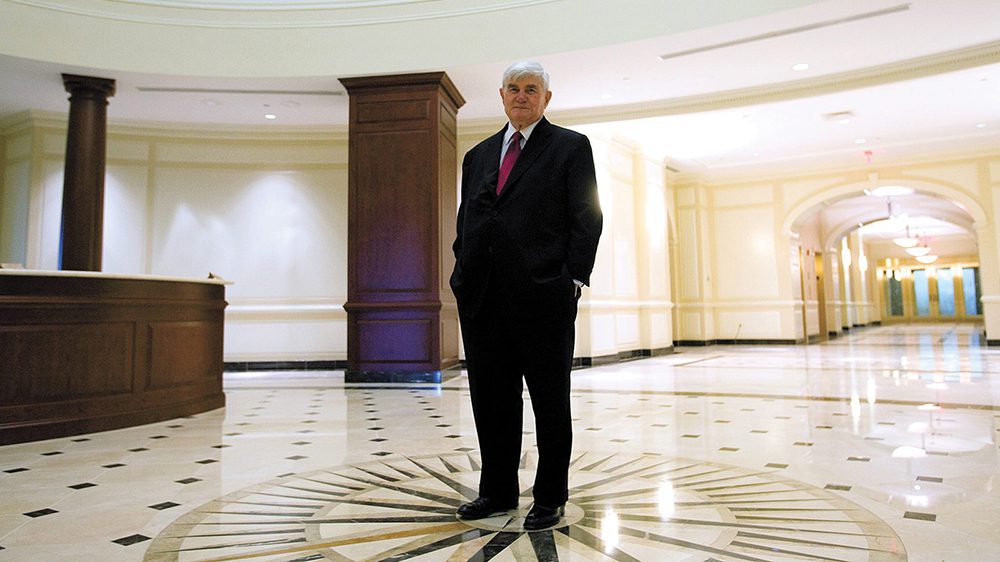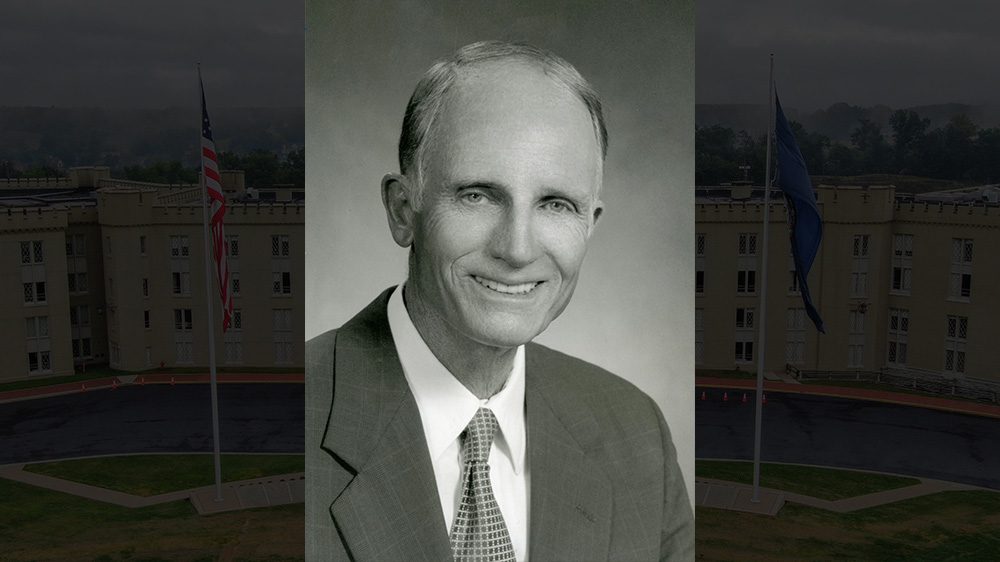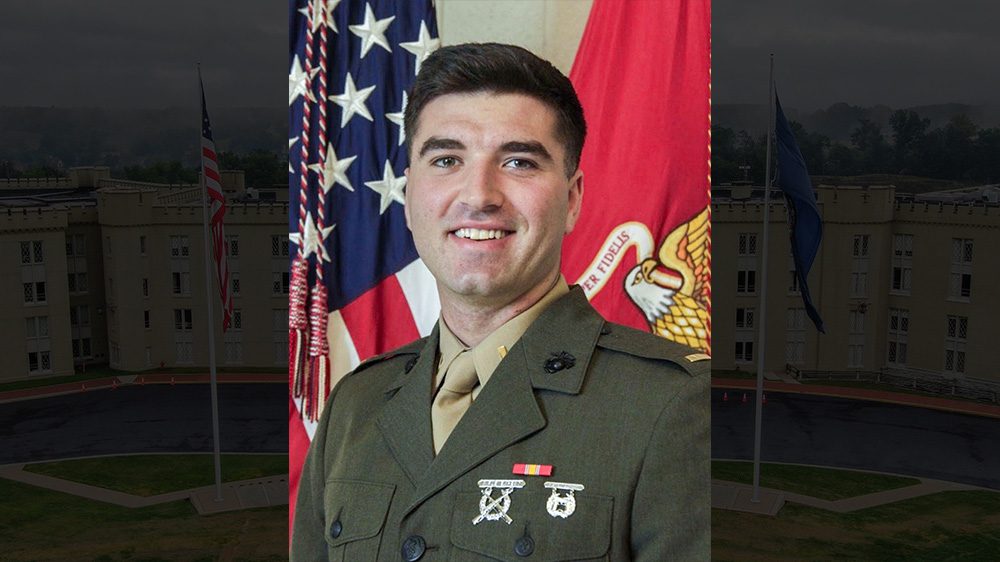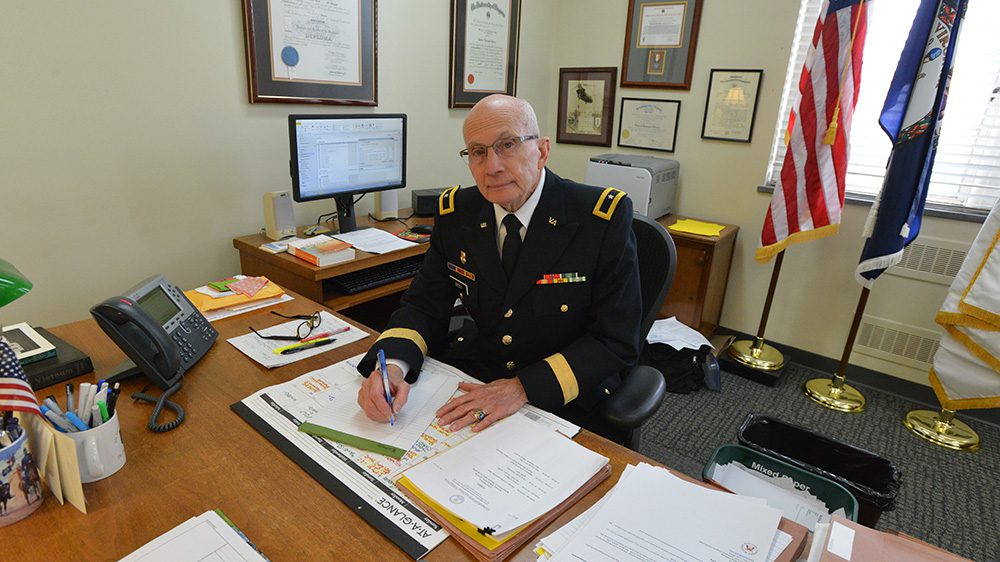P. Wesley Foster Jr. ’56, co-founder of one of the largest independent real estate firms in the United States who served on the boards of the VMI Foundation and VMI Keydet Club and two terms on the VMI Board of Visitors, died March 17, 2023. He was 89.
For many people in the Mid-Atlantic region, Foster’s name was a household word for decades. The company he co-founded in 1968, Long & Foster Realtors—which now has more than 200 offices and more than 8,500 agents working in eight states—has helped hundreds of thousands of people buy a home.
Building a company with that reach had to start somewhere, and for Foster, it was at VMI. Foster came to the Institute from the Atlanta, Georgia, area. An English major, Foster played varsity football for three years and participated as a rat in football, wrestling, and track. The historian for his class, he was on the General Committee and Executive Committee during his 1st Class year. Foster was a member of the Honor Court and Officer of the Guard Association president. He applied his literary interests to The Bomb and The Cadet, for which he was the Corps editor for the 1956 edition and a sportswriter, respectively.
He soldiered for two years as a U.S. Army field artillery officer in Germany, during which time he was the fire direction officer of an Honest John rocket battery assigned to the 8th Infantry Division, as well as the special weapons liaison officer to the Bundeswehr’s III Corps. He received the Army Commendation Medal and left service as a first lieutenant.
A preview of his often-audacious approach to business is what he did immediately after he left the Army in 1959: He drove a Volkswagen Beetle from Germany to Moscow and back. He was almost broke when he returned, but the Army shipped him and his car home free.
In 1959, he started working for Kaiser Aluminum’s Residential Products Division and ran a national program promoting aluminum building products to homebuilders throughout the country.
In 1963, he started selling houses for a Washington, D.C., area homebuilder. Three years later, he began learning the brokerage business at a small real estate company in Annandale, Virginia. There, he met Hank Long, a 1959 graduate of Virginia Polytechnic Institute and State University and a former U.S. Air Force B-47 pilot. In 1968, they struck out on their own, establishing Long & Foster. Foster oversaw the company’s residential real estate business, and Long managed the commercial business. They employed one agent. A coin toss decided the name of the company. Long won, and therefore, as Foster once put it, “he received top billing on the company letterhead.”
A company’s success often is based on being in the right place at the right time. In 1968, the D.C. area’s reputation was something of a dull company town, and Long & Foster posted $1 million in sales. In the 1970s, the area began transforming into a more cosmopolitan area with a burgeoning private sector, and development markedly accelerated. By 1982, the local residential and commercial real estate markets were booming, and Long & Foster had moved into Maryland and the District of Columbia. In that year, it reported $1 billion in sales.
Three years earlier, the investment company Merrill Lynch had taken notice of Long & Foster’s success and resiliency (it survived a serious market downturn in the 1970s) and offered to buy it. Eager to become a commercial developer, Long wanted to accept the offer. Foster was enjoying himself too much, however, and he bought out his partner.
Foster’s ambitions were expansive, and soon Long & Foster had established itself in other states. He also transformed Long & Foster into a company that was truly comprehensive, offering everything from mortgage and settlement services to homeowner’s insurance and property management.
In 2017, Foster sold his company to Home Services of America, an affiliate of Berkshire Hathaway, and became chairman emeritus. At the time of the sale, Long & Foster was, according to The Washington Post, “the nation’s largest independent real estate brokerage by sales volume.” The firm’s success continued, and according to the company’s website, it sold $27 billion worth of real estate in 2022.
There are many reasons for the extraordinary success of Long & Foster. But undoubtedly, it owed much to Foster’s character. The author of his history in the 1956 edition of The Bomb wrote, “Those who know Wes well are sure of his capabilities as a leader.” In a tribute to Foster on its website, the company mentioned his embrace of technology which he gave to his agents, and his decision to establish a school that trained his agents—and those of other firms, as well.
This success was also rooted in Foster’s determination to maintain a small, family company atmosphere throughout the enterprise. He maintained a policy, for example, under which any agent could call him on any issue. Furthermore, no matter how large his company became, he focused not on its image but on the work at hand. As he explained in an interview in 2003, “We don’t want to play big man on campus. We want to be humble but do a hell of a lot more than others.”
His history in The Bomb also mentioned Foster’s “ability to judge quickly and effectively difficult situations.” That ability stood him in good stead and helped preserve his company in an industry known as much for its “valleys” as its “peaks.” One year, in fact, he turned down his salary to ensure the company met its financial goals.
A dedicated professional citizen, Foster helped found two organizations of major brokerage firms, the Leading Real Estate Companies of the World and the Realty Alliance. He also served on the boards of corporations and local business organizations, including The Lane Construction Corporation, the Greater Washington Board of Trade, the First American Bank of Maryland, and the First Union National Bank of Virginia. He served as the chairman of the Washington/Baltimore Regional Authority and the Business Development Bureau of the Greater Washington Board of Trade.





